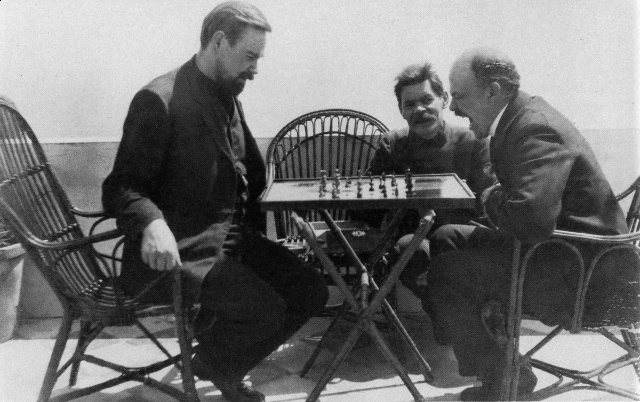Alexander Bogdanov: Tektology (1913–) [Russian, English]
Filed under book | Tags: · cognition, marxism, organization, philosophy, science, systems theory, tektology

Bogdanov playing chess with Lenin during a visit to Gorky on Capri, Italy, April 1908. (source)
Tektology is a term used by Alexander Bogdanov to describe a discipline that consisted of unifying all social, biological and physical sciences by considering them as systems of relationships and by seeking the organizational principles that underlie all systems.
Bogdanov’s work on tektology, published in Russia in two volumes in 1913 and 1917, anticipated many of the ideas that were popularized later by Norbert Wiener in Cybernetics and Ludwig von Bertalanffy in the General Systems Theory. There are suggestions that both Wiener and von Bertalanffy might have read the German edition of Tektology which was published in 1928. (from Wikipedia)
In Bogdanov’s philosophical endeavours there was one very important motive: from his point of view the philosophy of Marxism should be a philosophy of modern natural science and in this respect he acted in full accordance with Engels’ thesis that “with each epochal discovery, even in the natural-historical field, materialism should inevitably change its form.” (from the Foreword)
English edition
Publisher Intersystems Publications, Seaside/CA, 1980
265 pages
Russian edition
First published as The Universal Science of Organization (Tektologia), 1913-1917
This edition: Tektologia: Universal Organizational Science
Publisher Ekonomika, Moscow, 1989
303 and 352 pages
English edition
Foreword by Vadim N. Sadovsky and Vladimir V. Kelle
Edited with an Introduction by Peter Dudley
Translated by Vadim N. Sadovsky, Andrei Kartashov, Vladimir V. Kelle and Peter Bystrov
Publisher Centre for Systems Studies, University of Hull, 1996
ISBN 0859588769
322 pages
via Ken
Aleksandr Bogdanov and Systems Theory (Arran Gare, Democracy & Nature, 2000)
Against Social Determinism (McKenzie Wark, Public Seminar, 2013)
Essays in Tektology (English, trans. George Gorelik, 1980, added on 2013-12-23, via Marcell Mars)
Essays in Tektology, 2nd ed. (English, trans. George Gorelik, 1984, added on 2014-3-25, via Marcell Mars)
Тектология. Всеобщая организационная наука. том 1 (Russian, 1989, DJVU)
Тектология. Всеобщая организационная наука. том 2 (Russian, 1989, DJVU)
Bogdanov’s Tektology, Book 1 (English, trans. Vadim N. Sadovsky et al, 1996)
See Monoskop wiki for further writings of Bogdanov.
Comments (2)Bruce Clarke, Mark B. N. Hansen (eds.): Emergence and Embodiment: New Essays on Second-Order Systems Theory (2009)
Filed under book | Tags: · autopoiesis, body, cognition, complexity, cybernetics, emergence, neocybernetics, science, systems theory

“Emerging in the 1940s, the first cybernetics—the study of communication and control systems—was mainstreamed under the names artificial intelligence and computer science and taken up by the social sciences, the humanities, and the creative arts. In Emergence and Embodiment, Bruce Clarke and Mark B. N. Hansen focus on cybernetic developments that stem from the second-order turn in the 1970s, when the cyberneticist Heinz von Foerster catalyzed new thinking about the cognitive implications of self-referential systems. The crucial shift he inspired was from first-order cybernetics’ attention to homeostasis as a mode of autonomous self-regulation in mechanical and informatic systems, to second-order concepts of self-organization and autopoiesis in embodied and metabiotic systems. The collection opens with an interview with von Foerster and then traces the lines of neocybernetic thought that have followed from his work.
In response to the apparent dissolution of boundaries at work in the contemporary technosciences of emergence, neocybernetics observes that cognitive systems are operationally bounded, semi-autonomous entities coupled with their environments and other systems. Second-order systems theory stresses the recursive complexities of observation, mediation, and communication. Focused on the neocybernetic contributions of von Foerster, Francisco Varela, and Niklas Luhmann, this collection advances theoretical debates about the cultural, philosophical, and literary uses of their ideas. In addition to the interview with von Foerster, Emergence and Embodiment includes essays by Varela and Luhmann. It engages with Humberto Maturana’s and Varela’s creation of the concept of autopoiesis, Varela’s later work on neurophenomenology, and Luhmann’s adaptations of autopoiesis to social systems theory. Taken together, these essays illuminate the shared commitments uniting the broader discourse of neocybernetics.”
Contributors. Linda Brigham, Bruce Clarke, Mark B. N. Hansen, Edgar Landgraf, Ira Livingston, Niklas Luhmann, Hans-Georg Moeller, John Protevi, Michael Schiltz, Evan Thompson, Francisco J. Varela, Cary Wolfe.
Publisher Duke University Press, 2009
Science and Cultural Theory series
ISBN 0822391384, 9780822391388
xiii+296 pages
Reviews: Ramesh Mishra (MetaPsychology, 2010), Ana Teixeira Pinto (Int’l Studies in the Philosophy of Science, 2011), Jon Goodbun (Radical Philosophy, 2011), Peter Cariani (Constructivist Foundations, 2010).
PDF (updated on 2020-4-17)
Comment (0)Francis Spufford: Red Plenty: Inside the Fifties’ Soviet Dream (2010)
Filed under book | Tags: · 1950s, 1960s, communism, cybernetics, economy, engineering, history of computing, mathematics, politics, science, soviet union

This book is about the moment in the mid-20th century when people believed that the state-owned Soviet economy might genuinely outdo the market, and produce a world of rich communists and envious capitalists. Specifically, it’s about the last and cleverest version of the idea – central planning via cybernetics – and about how and why, in the 1960s, it failed. To give the economics some human depth, Red Plenty generates a miniature Soviet Union on the page, peopled by scientists and politicians, fixers and managers, dreamers and cynics.
Publisher Faber & Faber, 2010
ISBN 0571269478, 9780571269471
356 pages
EPUB (updated on 2019-11-20)
See also:
Red Plenty Platforms, essay by Nick Dyer-Witheford, Culture Machine 14, 2013
Red Plenty: A Crooked Timber, collection of essays inspired by the book, 2012

